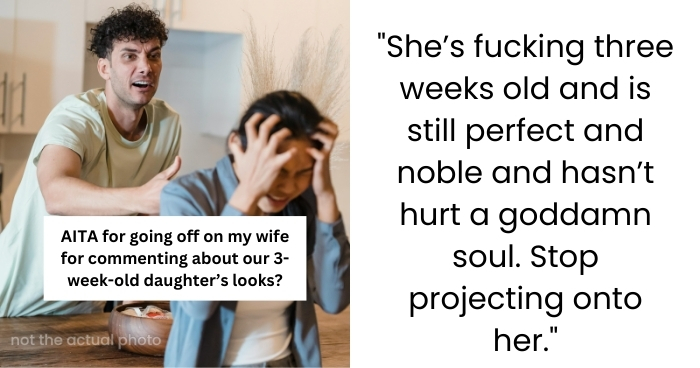Mom Criticizes Her Baby’s Appearance for Resembling Dad, Leading to a Heated Confrontation with Her Husband
The narrator shares a deeply personal conflict involving their wife, who has been making critical comments about their three-week-old daughter’s appearance. These comments, mostly comparing their daughter’s features unfavorably to her older brother and expressing disappointment that she inherited traits from the father, have escalated over time.
Despite initially addressing the comments with a softer approach, the narrator eventually snapped, expressing frustration in a heated and explicit outburst. While acknowledging that the wife’s behavior may be influenced by her postpartum depression (PPD) and her history with a critical mother, the narrator questions whether their reaction was appropriate, given the context.
Read for more info Reddit
Criticizing your child can have a negative impact not only on them but also on other family members.
Man shares his experience of his wife making hurtful comments about their three-week-old daughter’s appearance.












The narrator’s frustration is understandable. Repeated negative comments about a child’s appearance, even if the child is too young to comprehend them, can create a toxic environment. These remarks could influence the older sibling’s perceptions or foster insecurities in the family dynamic. Additionally, the narrator draws a valid comparison between the wife’s behavior and the emotional harm she experienced from her own mother, highlighting the potential long-term impact of such commentary.
Postpartum depression (PPD) and generalized anxiety disorder, both of which the wife is experiencing, are crucial factors to consider. PPD can significantly alter a person’s emotional state, leading to feelings of inadequacy, heightened sensitivity, or misplaced frustration. Her critical comments may reflect her internal struggles rather than genuine feelings about her daughter. However, PPD does not absolve harmful behavior, especially when it risks perpetuating cycles of emotional harm.
Postpartum depression affects one in seven mothers, impacting not only the mothers themselves but also their entire families.
Psychological Effects of Negative Comments on Appearance
Research shows that parental comments on a child’s appearance can have lasting effects on their self-esteem and body image. A study published in Body Image Journal (2020) highlights that even indirect exposure to appearance-focused remarks in infancy can shape familial attitudes, potentially influencing a child’s sense of self-worth later in life. This underscores the importance of fostering a positive and affirming environment early on.
Postpartum Depression and Family Dynamics
Postpartum depression affects approximately 1 in 7 new mothers, and one hallmark is the expression of negative self-talk or projecting insecurities. According to the American Psychological Association (APA), partners of individuals with PPD should approach sensitive conversations with compassion, offering support while encouraging professional intervention. While the narrator’s anger is justified, reframing their concerns with empathy may foster a more productive dialogue.
The Role of Generational Trauma
The wife’s comments suggest lingering effects of her mother’s critical parenting style. Studies on generational trauma, like those discussed in Development and Psychopathology (2018), reveal that unresolved issues from a parent-child relationship can unconsciously resurface in parenting behaviors. Therapy can be instrumental in breaking these cycles.
“People shared their thoughts and experiences in the comments, agreeing that the OP was not in the wrong in this situation.”






Verdict: Not the A-hole
The narrator acted out of concern for their child’s well-being and addressed harmful behavior stemming from the wife’s personal struggles. While their delivery could have been more measured, their underlying intentions—to protect their children and break a cycle of negativity—are commendable. A more empathetic approach moving forward can help resolve the conflict and promote healing for the entire family.





